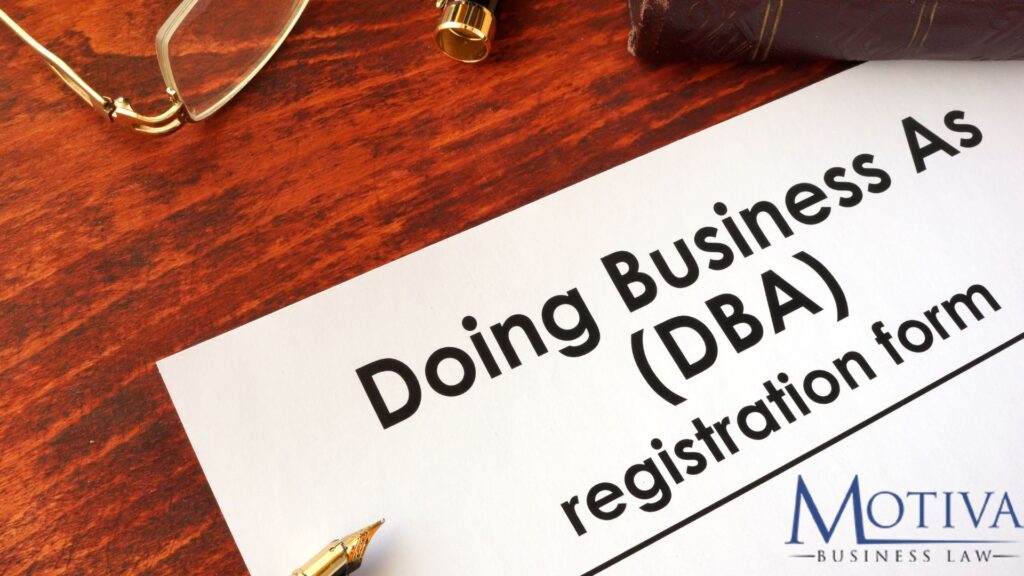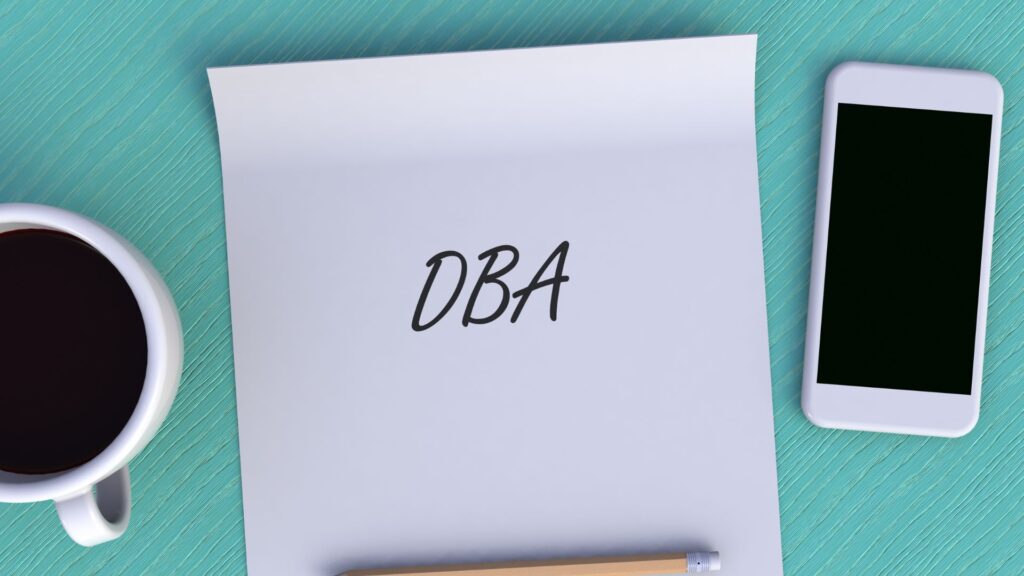A DBA, or “Doing Business As,” allows businesses to operate under a name that differs from their legally registered name. This setup is ideal for businesses seeking to create a unique brand identity, reach specific customer bases, or manage various services without altering their legal structure.
For companies considering growth, a DBA offers the flexibility to test new markets, create memorable brand names, or expand services while retaining the original business entity. Below, we’ll explore the purpose, advantages, and processes involved in obtaining a DBA.
What is a DBA?
A DBA, or “Doing Business As,” enables a business to operate publicly under an alternative name while maintaining its original legal identity. This option provides an effective way for companies to establish a brand or market identity that aligns with their business goals without creating a separate legal structure.
What Does DBA Stand For?
DBA stands for “Doing Business As” , indicating a business can publicly use an alternative name from its registered legal name. This arrangement allows companies to develop unique, marketable names without forming a new legal entity, offering flexibility to tailor the business’s public identity for specific audiences or services.
How is a DBA Different From a Legal Name Or Trade Name?
A DBA acts as an alias that differs from both a legal name and a trade name. A business’s legal name is the one registered with government agencies and used in official documents, while a trade name can represent specific products or services.
Unlike a legal name, a DBA provides flexibility, allowing a business to operate publicly under a unique identity that can support brand positioning and customer engagement. This distinction also has contract implications, as understanding the legal nuances of business names can be essential for compliance and clarity.
For example, if a sole proprietor registers a DBA like “Sunshine Gardens,” the legal name remains the owner’s name, but the DBA provides a more marketable brand for customer engagement.
Why Would a Business Use a DBA?
Businesses use DBAs to enhance brand visibility, enter new markets, and organize various operations under distinct identities. Typical reasons include:
- Branding Flexibility: Use a memorable, customer-focused name.
- Market Expansion: Operate in new locations or industries without forming a separate entity.
- Operational Organization: Manage different product lines or services under clear, separate identities.
These uses illustrate how DBAs serve as essential assets for brand-building, market adaptability, and efficient management, positioning companies for sustainable growth.
What Are the Benefits of Having a DBA?

A DBA offers several advantages for businesses, including brand flexibility, legal compliance, and ease in financial operations. These benefits make DBAs a practical choice for businesses aiming to align their brand with customer expectations and operate smoothly under a distinct name.
- Brand Flexibility: A DBA allows a business to operate under a market-friendly name, enhancing brand identity without legal restructuring.
- Legal Compliance: Many states require a DBA to operate under a different name, which helps ensure businesses meet state and local regulations.
- Banking Ease: Having a DBA enables businesses to open bank accounts under their chosen name, supporting smoother financial management.
Once you understand the benefits, the next step is to consider whether your specific business structure might require a DBA.
How Does a DBA Enhance Your Brand Identity?
A DBA supports brand development by allowing businesses to choose names that resonate with target audiences. For companies looking to establish a memorable or recognizable identity, a DBA provides flexibility to position their brand effectively.
For example, many businesses use DBAs to create unique names that reflect their market niche or values. This flexibility in naming can also carry trademark considerations for DBAs, especially if brand protection is a priority.
How Does a DBA Help With Business Banking and Legal Compliance?
A DBA enables businesses to manage their finances and meet regulatory requirements more efficiently. For many banks, a DBA is required for opening business accounts under an alternate name, supporting clear financial tracking and legal compliance.
Operating under a DBA also helps ensure that the business name aligns with local and state regulations, which can streamline both daily transactions and official documentation. This clarity benefits businesses aiming for straightforward legal compliance.
Can a DBA Help Expand Your Business?
Using a DBA facilitates business growth by allowing companies to expand into new markets or product categories without forming a separate legal entity. For example, businesses can use DBAs to target different customer demographics, explore niche markets, or diversify product lines—all while keeping operations flexible.
This growth potential makes DBAs an appealing option for companies ready to broaden their reach while maintaining streamlined operations.
What Types of Businesses Need a DBA?
Certain business types frequently use DBAs to operate under a name different from their official legal designation. Here’s a breakdown:
- Sole Proprietorships: Often require DBAs, as these businesses typically operate under the owner’s name, and a DBA provides a professional, distinct brand name.
- Partnerships: DBAs allow partnerships to create a unified business identity separate from the partners’ personal names.
- LLCs and Corporations: Use DBAs to brand new products, services, or business lines without forming separate entities.
- Franchises: Frequently use DBAs to operate under a franchisor’s brand, aligning with established branding while retaining local ownership.
Now that you understand the benefits, let’s explore how DBAs specifically impact sole proprietorships and partnerships.
Do Partnerships and Sole Proprietorships Need a DBA?
Partnerships and sole proprietorships often rely on DBAs to create a distinct business identity. For sole proprietors, a DBA helps separate personal and business identities, enhancing credibility.
For example, a sole proprietor operating as “John Smith” can use a DBA like “Smith Home Services” to present a professional business name to customers.
Partnerships also benefit from DBAs, which allow them to present a unified brand name to customers.
This flexibility allows smaller business structures to develop professional brand identities and improve market appeal without requiring new legal entities.
Do LLCs and corporations need a DBA?
LLCs and corporations may use DBAs to diversify and brand unique segments or product lines under distinct identities. For instance, an LLC could launch a new product under a market-focused name using a DBA, enabling brand diversification without creating a new entity.
For example, an LLC named “Eco Innovations” could launch an eco-friendly product line under a DBA like “Green Life Essentials,” allowing the business to appeal to a targeted audience without forming a new legal entity.
This flexibility supports brand clarity, enabling businesses to cater to specific market segments or expand without restructuring.
Do franchises need a DBA?
Franchises frequently operate under DBAs to align with franchisors’ established brands while retaining local control and ownership. For example, a franchisee may use a DBA to trade under the parent company’s well-known brand, gaining credibility and attracting customers.
For instance, a local franchisee for “Healthy Eats” may use a DBA to trade under the parent company’s well-known name, leveraging the franchise’s credibility and customer trust.
Using a DBA also often meets franchise compliance requirements and aligns with brand consistency.
What are the specific benefits for sole proprietorships using a DBA?
For sole proprietorships, a DBA boosts brand credibility, offers a separation from the owner’s personal name, and supports brand flexibility. Key benefits include:
- Professional Appearance: Use a business-focused name rather than the owner’s, enhancing marketability.
- Credibility: Operate under a recognizable, customer-friendly name that reinforces brand presence.
- Growth Flexibility: Adapt the business name as the business grows or enters new markets.
These advantages help sole proprietors build a reputable market presence while keeping operations straightforward.
How Do You Register a DBA?

To register a DBA, businesses typically follow a step-by-step process that varies by state. After identifying the need for a DBA, here’s how to complete the registration:
- Verify Name Availability: Ensure the DBA name you want isn’t already in use within your state by checking with your local or state government database.
- Complete the DBA Registration Form: Fill out the necessary forms required by your state, often available on your state’s business department website.
- File the Form with Your Local or State Office: Submit the completed form along with a filing fee, which can vary by state.
- Publish Notice (if required): Some states require you to publish a notice of your DBA in a local newspaper for public awareness.
- Obtain Your DBA Certificate: Once approved, you’ll receive a DBA certificate, authorizing you to operate under the chosen name.
What Forms Are Required for DBA Registration?
Registering a DBA generally requires a few key documents:
- DBA Registration Form: This is the primary form needed, detailing your legal business name, owner details, and chosen DBA name.
- Proof of Identity: Some states require identification for business owners.
- DBA Certificate: Once filed and approved, you’ll receive this certificate, which acts as proof of your DBA registration.
Proper documentation ensures compliance with legal requirements. If you have questions on the specifics, consult our Contract Law services for detailed guidance on documentation for DBA registration.
How Much Does It Cost to File a DBA?
Filing fees for a DBA vary widely depending on the state:
- Typical Costs: Fees range from $10 to $100, depending on the location. For instance, California charges around $40 for a DBA filing, while Texas fees are approximately $35.
- Additional Costs: Some states require periodic renewals, so be aware of potential ongoing fees.
Understanding the costs associated with a DBA ensures proper budgeting for your business’s legal needs.
How Long Does a DBA Last?
Most states set an expiration period for a DBA, often around five years. After this period, you’ll need to renew the registration to keep using the DBA name. Renewal processes typically occur through the county clerk’s office or a state office, depending on your jurisdiction. It’s crucial to file for renewal before expiration to avoid operational disruptions.
What Are the State-Specific Requirements for Registering a DBA?
State-specific requirements for DBAs can vary in filing fees, processing times, and renewal periods. Here’s an example table of DBA requirements by state:
| State | Filing Fee | Processing Time | Renewal Period |
| Florida | $50 | 1-2 weeks | 5 years |
| California | $40 | 2-4 weeks | 5 years |
| New York | $25 | 1 week | 10 years |
| Texas | $35 | 1-3 weeks | 10 years |
Knowing your state’s specific requirements helps ensure timely and compliant DBA registration.
Making Changes to a DBA
If there’s a change in officers, partners, or members, or you need to adjust the DBA name, you may need to file an amendment or even a new DBA, depending on your state’s requirements. For instance, changes in members for an LLC or partners in a general partnership might require re-filing rather than just amending the existing DBA.
When first filing your DBA, ask the clerk about the approval process and timelines, as processing times vary by location. In many states, approval can take one to four weeks. County and state offices provide specific information about amendments, which is essential for compliance if you’re planning adjustments.
DBA Renewal Process
DBAs are subject to jurisdictional rules, and fictitious name registration may differ between states. For most businesses, DBA renewals require re-filing forms and paying a renewal fee at regular intervals. Some states may even mandate a DBA amendment if substantial business information changes.
How Does a DBA Compare to Other Business Structures?
When choosing between a DBA and other business structures like an LLC or corporation, you have to understand the key differences in terms of liability, costs, and operational implications. Here’s a breakdown to help you determine the best fit for your business needs:
| Business Structure | Legal Status | Liability Protection | Filing Fees | Tax Structure |
| DBA | Not a separate legal entity | No personal liability protection | Lower fees | Taxes flow through owner |
| LLC | Separate legal entity | Provides personal liability protection | Higher than DBA fees | Can be taxed as a corporation |
| Corporation | Separate legal entity | Strongest liability protection | Highest fees | Corporate tax structure |
Each structure has unique benefits, from the low cost and flexibility of a DBA to the liability protection an LLC offers. For personalized advice on structuring your business, consult our Startups and Business Law services for DBA vs. LLC guidance.
What Are the Differences Between a DBA and an LLC?

A DBA and an LLC differ significantly in terms of liability, legal status, and operational flexibility:
| Feature | DBA | LLC |
| Legal Status | Not a separate legal entity | Separate legal entity |
| Liability | No personal liability protection | Provides personal liability protection |
| Filing Fees | Typically lower | Higher fees compared to DBA |
| Tax Structure | Taxes flow through owner | Can be taxed as a corporation |
A DBA is ideal for simple business needs without legal protection, while an LLC offers liability shielding, making it suitable for businesses with risk exposure. This comparison highlights why businesses may opt for an LLC over a DBA for additional legal protection.
Should You Register a DBA or Incorporate Your Business?
Choosing between a DBA and incorporation depends on your business’s liability and operational needs. A DBA is effective for branding flexibility without adding a new legal structure, making it suitable for lower-risk businesses or simple market branding.
Incorporation, on the other hand, offers liability protection and a formal structure that’s beneficial for companies needing investor engagement, asset protection, or expanded growth potential. For businesses weighing these options, incorporating provides a solid foundation for scaling operations and accessing certain legal protections.
Frequently Asked Questions About DBA
Now that we’ve covered the essentials of DBAs, here are answers to some of the most frequently asked questions by business owners. These answers clarify DBA registration, usage, and legal considerations.
What is a DBA Certificate, and Why Do I Need One?
A DBA certificate serves as official documentation of your DBA registration, confirming that your business is legally allowed to operate under an alternative name. Obtaining a DBA certificate is required in many states as part of the registration process and provides proof of your DBA for banking, compliance, and legal purposes.
For example, most banks require a DBA certificate to open a business account under the DBA name, which helps businesses manage finances professionally.
Can a Business Have More Than One DBA?
Yes, a business can register multiple DBAs if it operates different brands, products, or services that require separate identities. For instance, an LLC called “Fresh Foods LLC” might register separate DBAs like “Healthy Bites” and “Green Grocer” to target different customer groups.
Using multiple DBAs allows businesses to diversify without creating new legal entities, offering flexibility for market expansion.
Can I Use My Personal Name Instead of a DBA?
Using a personal name for a business is allowed, especially for sole proprietors. However, a DBA may still be required if you want to use a distinct business name that doesn’t include your full legal name. For example, “Jane Doe Consulting” can operate without a DBA, but “Doe Strategies” would likely require DBA registration.
A DBA offers a more professional image and can help create a brand identity distinct from the owner’s personal name.
Can Sole Proprietorships Use a DBA Without Registering an LLC?
Yes, sole proprietorships can operate under a DBA without needing to form an LLC. Registering a DBA allows sole proprietors to use a unique business name for branding purposes while keeping the straightforward structure of a sole proprietorship.
This setup is beneficial for sole proprietors who want a distinct business identity without the additional requirements and protections of an LLC.


